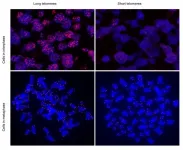Electrically switchable qubit can tune between storage and fast calculation modes
A tiny germanium; silicon nanowire takes a big step towards a scalable quantum computer
2021-01-11
(Press-News.org) To perform calculations, quantum computers need qubits to act as elementary building blocks that process and store information. Now, physicists have produced a new type of qubit that can be switched from a stable idle mode to a fast calculation mode. The concept would also allow a large number of qubits to be combined into a powerful quantum computer, as researchers from the University of Basel and TU Eindhoven have reported in the journal Nature Nanotechnology.
Compared with conventional bits, quantum bits (qubits) are much more fragile and can lose their information content very quickly. The challenge for quantum computing is therefore to keep the sensitive qubits stable over a prolonged period of time, while at the same time finding ways to perform rapid quantum operations. Now, physicists from the University of Basel and TU Eindhoven have developed a switchable qubit that should allow quantum computers to do both.
The new type of qubit has a stable but slow state that is suitable for storing quantum information. However, the researchers were also able to switch the qubit into a much faster but less stable manipulation mode by applying an electrical voltage. In this state, the qubits can be used to process information quickly.
Selective coupling of individual spins
In their experiment, the researchers created the qubits in the form of "hole spins". These are formed when an electron is deliberately removed from a semiconductor, and the resulting hole has a spin that can adopt two states, up and down - analogous to the values 0 and 1 in classical bits. In the new type of qubit, these spins can be selectively coupled - via a photon, for example - to other spins by tuning their resonant frequencies.
This capability is vital, since the construction of a powerful quantum computer requires the ability to selectively control and interconnect many individual qubits. Scalability is particularly necessary to reduce the error rate in quantum calculations.
Ultrafast spin manipulation
The researchers were also able to use the electrical switch to manipulate the spin qubits at record speed. "The spin can be coherently flipped from up to down in as little as a nanosecond," says project leader Professor Dominik Zumbühl from the Department of Physics at the University of Basel. "That would allow up to a billion switches per second. Spin qubit technology is therefore already approaching the clock speeds of today's conventional computers."
For their experiments, the researchers used a semiconductor nanowire made of silicon and germanium. Produced at TU Eindhoven, the wire has a tiny diameter of about 20 nanometers. As the qubit is therefore also extremely small, it should in principle be possible to incorporate millions or even billions of these qubits onto a chip.
INFORMATION:
[Attachments] See images for this press release:

ELSE PRESS RELEASES FROM THIS DATE:
2021-01-11
Diets rich in healthy and plant-based foods encourages the presence of gut microbes that are linked to a lower risk of common illnesses including heart disease, research has found.
A large-scale international study using metagenomics and blood chemical profiling has uncovered a panel of 15 gut microbes associated with lower risks of common conditions such as obesity and type 2 diabetes. The study has been published today in Nature Medicine from researchers at King's College London, Massachusetts General Hospital (MGH), Harvard T.H. Chan School of Public Health, the University ...
2021-01-11
With the Proof of Concept funding line, the ERC grants recipients of ERC frontier research funds (Starting, Consolidator, Advanced or Synergy grants) with 150.000 Euro to develop promising ideas with commercial or societal potential to the proof of concept stage. With this funding, Olaf Groß and his team in the Metabolism and Inflammation Group at the Institute of Neuropathology of the Medical Center - University of Freiburg will test whether a new class of immune activating drugs they discovered can boost the effectiveness of cancer immunotherapies ...
2021-01-11
Heidelberg/Germany, 11 January 2021 - Development of an in vitro human-derived tissue model for studying virus infection and disease progression in the alveolar cells of the lungs responsible for oxygen and carbon dioxide exchange with the blood might enable the study of possible therapies for acute respiratory distress syndrome (ARDS) triggered by SARS-CoV-2. Researchers in the Netherlands have demonstrated that the SARS-CoV-2 replicates efficiently in their model resembling the human bronchioalveolar system that is thought to play a critical role in progression of infection towards pneumonia and ARDS.
It is already ...
2021-01-11
Two billion years after the Big Bang, the Universe was still very young. However, thousands of huge galaxies, rich in stars and dust, were already formed. An international study, led by SISSA - Scuola Internazionale Superiore di Studi Avanzati, now explains how this was possible. Scientists combined observational and theoretical methods to identify the physical processes behind their evolution and, for the first time, found evidence for a rapid growth of dust due to a high concentration of metals in the distant Universe. The study, published in Astronomy&Astrophysics, offers a new approach to investigate the evolutionary phase of massive objects.
Since their initial discovery 20 years ago, very distant and massive galaxies that form prodigious amount of ...
2021-01-11
Patients with severe COVID-19 disease have significantly shorter telomeres, according to a study conducted by researchers at the Spanish National Cancer Research Centre (CNIO) in collaboration with the COVID-IFEMA Field Hospital, published in the journal Aging. The study, led by Maria A. Blasco and whose first authors are Raúl Sánchez and Ana Guío-Carrión, postulates that telomere shortening as a consequence of the viral infection impedes tissue regeneration and that this is why a significant number of patients suffer prolonged sequelae.
Blasco was already developing a therapy to regenerate lung tissue in pulmonary fibrosis patients; she now believes that this treatment -which should still take at least a year and a half to become available- ...
2021-01-11
NEW YORK, NY (Jan. 11, 2021)--A new study has found that up to 20% of glioblastomas--an aggressive brain cancer--are fueled by overactive mitochondria and may be treatable with drugs currently in clinical trials.
Mitochondria are responsible for creating the energy that fuels all cells. Though they are usually less efficient at producing energy in cancer, tumor cells in this newly identified type of glioblastoma rely on the extra energy provided by overactive mitochondria to survive.
The study, by cancer scientists at Columbia University's Vagelos College ...
2021-01-11
For some years, an active substance from the leaves of an ornamental plant has been regarded as a possible forerunner of a new group of potent drugs. So far, however, it has been very laborious to manufacture it in large quantities. That could now change: Researchers at the University of Bonn (Germany) have identified a bacterium that produces the substance and can also be easily cultivated in the laboratory. The results are published in the journal Nature Communications.
The coralberry currently once again adorns many living rooms: In winter it bears bright red fruits, which make it a popular ornamental plant at this time of year. For pharmacists, however, it is interesting for a different reason: It contains ...
2021-01-11
CHAMPAIGN, Ill. -- For years, researchers have worked to repurpose excess atmospheric carbon dioxide into new chemicals, fuels and other products traditionally made from hydrocarbons harvested from fossil fuels. The recent push to mitigate the climactic effects of greenhouse gases in the atmosphere has chemists on their toes to find the most efficient means possible. A new study introduces an electrochemical reaction, enhanced by polymers, to improve CO2-to-ethylene conversion efficiency over previous attempts.
The results of the study led by University of Illinois Urbana-Champaign chemistry ...
2021-01-11
Metabolites are organic molecules that take part in or are created during the biochemical reactions constantly taking place in an organism. For the human body, more than 110,000 metabolites have been identified. Metabolites play a role in metabolic syndrome, which is the situation in which several medical conditions occur simultaneously; the conditions include obesity, high blood pressure and high blood sugar. Metabolic syndrome is associated with a higher risk of developing cardiovascular disease, type-2 diabetes and different kinds of cancer. The presence of certain metabolites can be an indicator for particular pathological ...
2021-01-11
This most likely explains the augmented response of the immune system and the more severe disease progression. However, certain hypertension-reducing drugs known as ACE inhibitors can have a beneficial effect. They not only lower blood pressure, but also counteract immune hyperactivation. The scientists have now published their findings in the journal Nature Biotechnology.
More than one billion people worldwide suffer from high blood pressure, or hypertension. Of the more than 75 million people around the world who have become infected with the SARS-CoV-2 virus worldwide so far, more than 16 million also have hypertension. These patients are more likely to become severely ill, which in turn results in an increased ...
LAST 30 PRESS RELEASES:
[Press-News.org] Electrically switchable qubit can tune between storage and fast calculation modes
A tiny germanium; silicon nanowire takes a big step towards a scalable quantum computer




